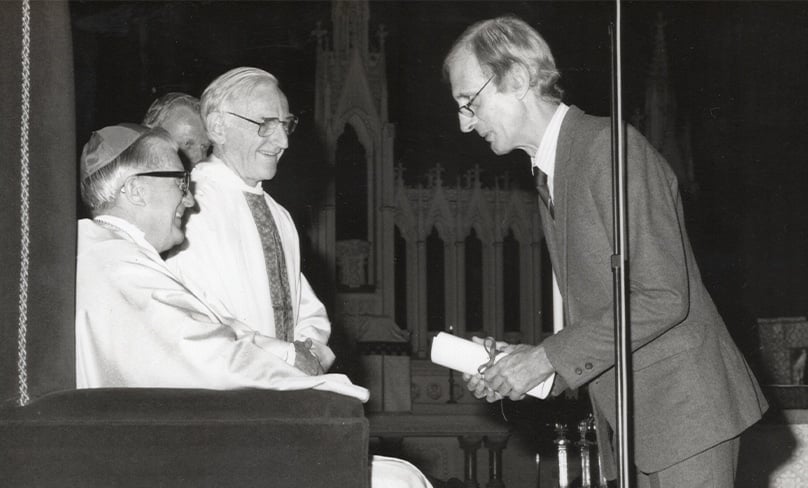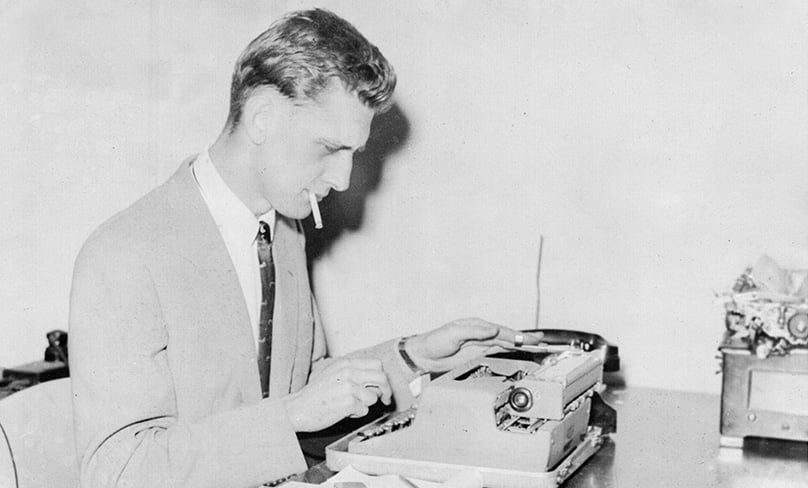
Crusading journalist Cliff Baxter, convert to the Roman Catholic faith and longstanding staff writer for The Catholic Weekly, died in the peace of the church on 29 July and was buried after his Requiem Mass on 23 August at Our Lady of Perpetual Succour in Erskineville.
A journalist of the “old school,” Mr Baxter’s indefatigable reporting was a mainstay of this newspaper during his decade as a staff reporter, so much so that Cardinal Edward Clancy called it The Baxter Weekly and gave him a citation for his outstanding contribution to media.
He arrived at The Catholic Weekly after a storied career at The Canberra Times, The Courier-Mail, the ABC and Fleet Street, winning accolades and rating as a Walkley Awards finalist four times.
But his real achievements were in the impact his stories made, often at no small personal risk, which drew on a wide and deep network of church sources in Australia and the region.
Starting at The Catholic Weekly in the mid-1980s, he broke stories on national and international affairs and was known for his sparkling prose and committed faith.
He was influential in garnering sympathy for the East Timorese resistance to Indonesian occupation in Australia, and reported on massacres in that country.
Cliff’s reporting in the Weekly played a major role in the 1984 release of Columban Fathers Brian Gore and Niall O’Brien from a Philippines gaol for trumped-up murder charges.
He reported on wealthy Australian paedophiles’ activities in the Philippines, investigated clergy abuse, and was a staunch advocate for justice for Aboriginal people who had died in custody, calling the deaths “murders.”
“The Weekly carried more stories about atrocities in Indonesia, West Irian [West Papua], Malaysia, Singapore and the Philippines than Socialist publications,” his widow, Bronwyn Baxter, said in her eulogy.
“And the stories were backed by church sources and eyewitnesses.”
“When he said he was going to The Catholic Weekly, I said, ‘Why would you leave the ABC to go to The Catholic Weekly? It’s not a very good paper.’

“‘That’s because I’m not working there,’ he replied—Cliff was very modest.”
But Mrs Baxter added, with a smile, that she thought the church had been “reasonably indulgent” to her husband.
“Getting these stories in The Catholic Weekly, other papers would have to follow … that quip about Baxter’s Weekly was reality. When he’d started, he’d write the whole paper,” she said.
His colleague and friend John Coleman, who met Cliff in the 1960s on The Courier-Mail and later edited Brisbane’s Catholic Leader for more than a decade, said in a eulogy read by friend Elaine Hudson that Cliff “defended all that was good about the profession.”
“He was passionate about journalism, and those colleagues throughout his life, upholding the profession’s code of ethics which, among other things, says the news must be reported with scrupulous honesty and one should never take unfair advantage of a colleague.
“That may seem strange considering sections of today’s media, but in another era it was our way of life.”
Reflecting on their time together at The Courier-Mail, Mr Coleman said, “I was always impressed by Cliff’s skilful shorthand and the humanity he injected into stories.
“Inevitably he’d pause from hammering his typewriter with, ‘Give us a smoke, Johnno!’
“I never quite knew why Cliff had moved from a successful career to the limited circulation and little-appreciated Catholic press, other than his unwavering belief in God, sense of social justice, and desire to put journalism to a better purpose.”
The Requiem Mass was celebrated by Fr Paul Hilder, who was private secretary to Cardinal Clancy during Mr Baxter’s career at The Catholic Weekly.
“He was poor in spirit, he was gentle, he knew what it was to share sorrow with others. He had a great thirst for what is right, and always fought for justice. And he was a great journalist too,” Fr Hilder said.
